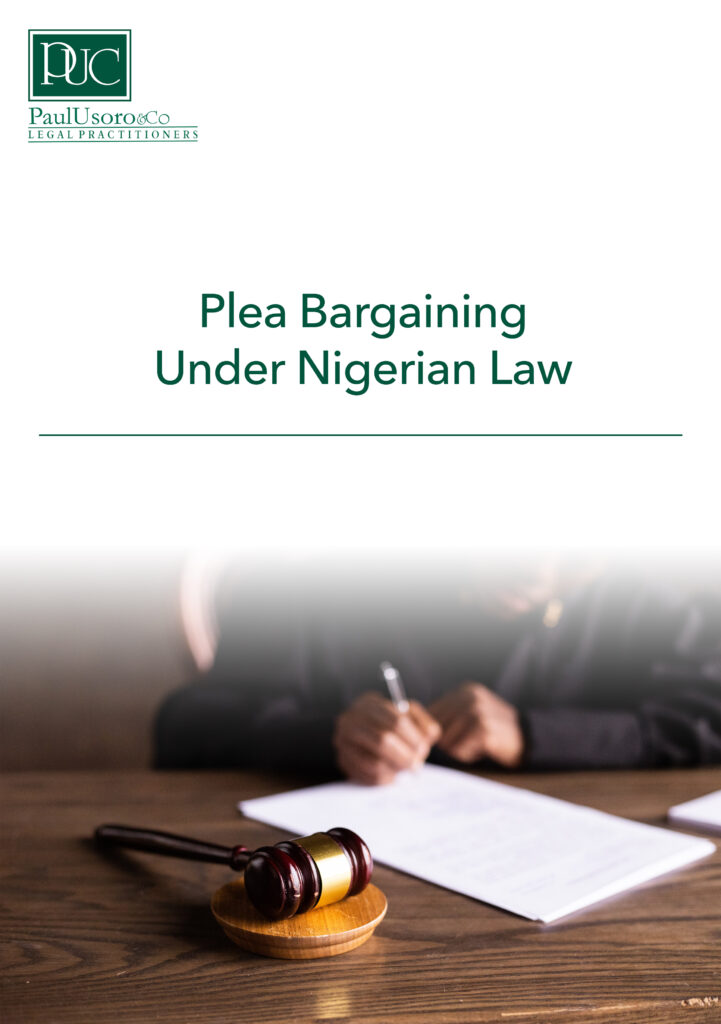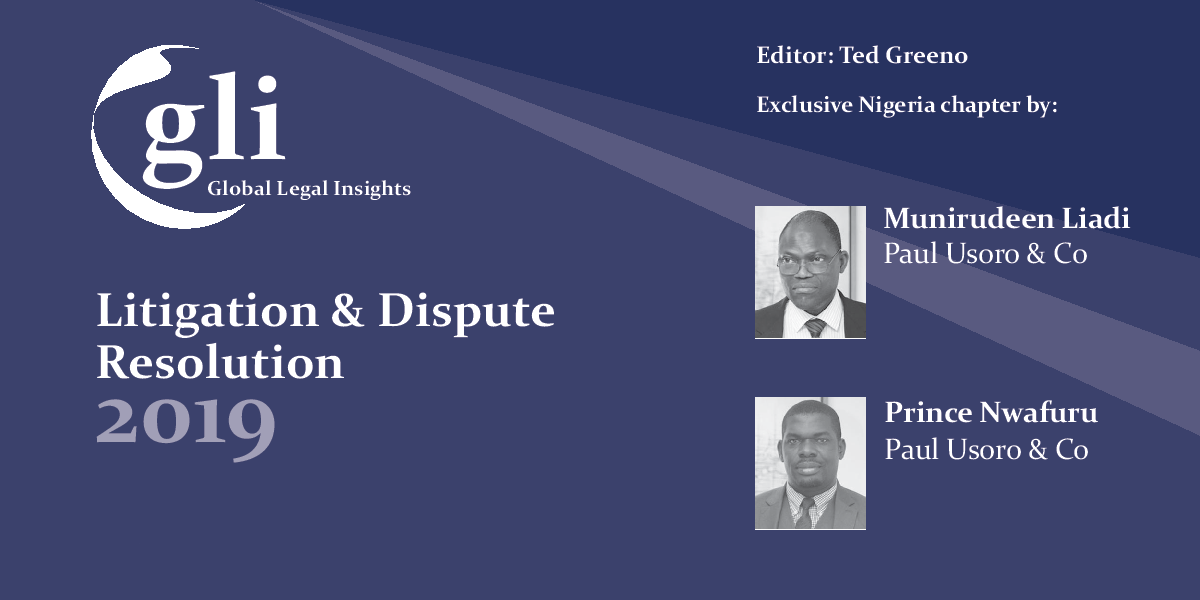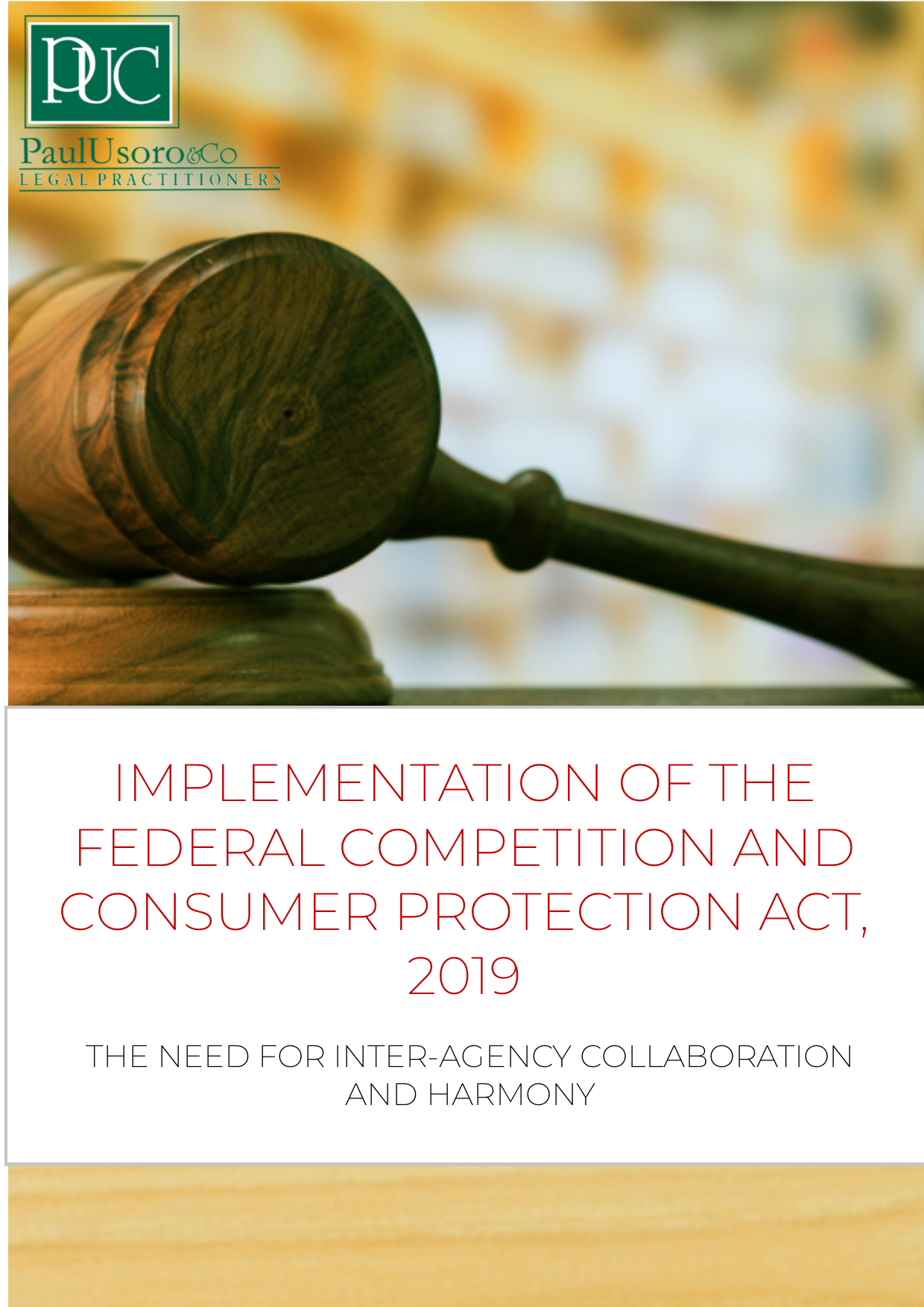Introduction
The usual outcome of ‘guilty’ or ‘not guilty’ and or ‘sentencing’ in a criminal trial which was largely determined by the legal principles of ‘proof beyond reasonable doubt’ and ‘presumption of innocence’ has been resolved by the now common aspect of a negotiated agreement by parties to the criminal proceedings. In real terms, parties’ concession underlies the basis for a successful plea bargain to bridge the gap in circumstances where the prosecution is unable to procure compelling and conclusive evidence against the accused or co-accused necessary for the Court’s finding of ‘guilty’ and gives an opportunity to an accused person to elect not to proceed with the trial.
A plea bargain in ordinary parlance is a negotiated term of settlement in criminal trials between the prosecution and the accused, wherein the accused pleads guilty to a lesser offence or reduced charge in exchange for a reduction in sentence or dismissal of the charges,[1] which is finally accepted by the Court. Simpliciter, plea bargaining means a ‘conviction without trial.’ There are different types of plea bargain. Most specifically, is the charge bargain in which a prosecutor agrees to drop some of the counts or reduce the charge to a less serious offence in exchange for a plea of either guilty or no contest from the Defendant. The second type of bargain is a plea bargain in which a prosecutor agrees to recommend a lighter sentence in exchange for a plea of either guilty or no contest from the Defendant.[2] There is also the count bargain, in which a Defendant who is faced with multiple charges will be allowed to plead guilty to fewer counts of the charge. This is however not a common form of the plea bargain as it only applies to Defendants who are faced with multiple charges.[3]
Plea Bargain – Historical Background
The origin of the plea bargain can be traced to the American legal system in the eighteenth century. It began by convention but after it was accepted by the Courts, it became entrenched in the Federal and state criminal procedure rules.
The concept of the ‘plea bargain’ achieved its global recognition in 1970 in the landmark case of Brady v. United States,[4] by the Supreme Court of the United States of America where Brady who pleaded guilty to a kidnaping charge in violation of 18 U.S.C. § 1201(a) and whose sentence was 50 years imprisonment, was later reduced to 30.
This was adopted due to the adversarial nature of the United States’ judicial system which places the judges as an umpire, in which they are completely dependent upon the parties to develop the factual record and cannot independently discover information to assess the strength of the case against the Defendant. There are several cases where the US Courts have given full effect to plea bargains and as at today, 95% of criminal cases in the United States of America have been resolved by plea bargains.[5]
Plea bargaining as a concept was not known in Nigerian Criminal Justice jurisprudence until 2004. It became known and applied with the establishment of the Economic and Financial Crimes Commission (EFCC) Act following increased level of corruption, as the concept was provided for under Section 14(2) of the EFCC Act. This concept of the plea bargain was also boldly institutionalized by Lagos State House of Assembly in the Administration of Criminal Justice Law 2011, Laws of Lagos State.[6]
Plea Bargaining under the EFCC Act
Section 14(2) EFCC Act empowers the commission (subject to the prosecutorial powers of the Attorney-General under Section 174 of the Constitution to institute, continue or discontinue criminal proceedings against any persons in any court of law), to compound any offence punishable under the EFCC Act by accepting such sum of money as it thinks fit not exceeding the maximum amount to which that person would have been liable if he had been convicted of that offence. This discretionary power given to the EFCC coupled with the authority to compound offences exemplifies the proposed concept of plea bargaining under the Nigerian law. This provision has been given full interpretation and application by the Courts in several high-profile cases.[7]
However, the Economic and Financial Crimes Commission (EFCC) has been criticized for this provision and it has been termed as “smuggling” the plea bargain concept, which has been described as dubious into our legal system to prosecute public officers involved in money laundering and looting of the public treasury.[8] It has also been described as corruption to bring plea bargaining into the law of Nigeria.[9]
At a cursory look at the provision, one may argue rightly that there is no express or implied mention of plea bargaining under Section 14(2) of the EFCC Act and as such, what the section envisages is “compounding of offences’ which is an act in which a person agrees not to report the occurrence of a crime or not to prosecute an accused in exchange for money or other consideration. This is not the same as plea bargaining. The Section does not show the nature and type of the plea bargain neither does it show the stage of the proceedings at which the bargain may be initiated. There is also no laid down procedure or safeguards for plea bargaining and such agreement as envisaged under the EFCC Act does not necessarily culminate in a judgment neither does it lead to conviction nor sentencing. It is to be noted that compounding of a felony is an offence in itself.[10] It may also be argued that the purport of the EFCC Act may be the concept of Withdrawal of Compliant under Section 355 of the ACJA which provides that where a complainant at any time before a final order is made in a case, satisfies the court that there are sufficient grounds for permitting him to withdraw his complaint, the court may permit him to withdraw the complaint and shall thereupon acquit the Defendant. It may also be argued to mean reconciliation as provided under Section 23 of the High Court Law of Lagos State, 2019 which provides that in criminal cases, the High Court may encourage and facilitate the settlement in an amicable way of proceedings for Common Assault or for any other offence not amounting to a felony and not aggravated in degree, on terms of payment of compensation or other terms approved by court.
Plea Bargaining under the ACJL Lagos
The first attempt at codifying the concept of plea bargaining in Nigeria was under the provisions of the Administration of Criminal Justice Law of Lagos State (ACJL), 2007. Section 75 of the ACJL provides thus:
“The Attorney-General of the State shall have power to consider and accept a plea bargain from a person charged with an offence where the Attorney General is of the view that the acceptance of such plea bargain is in the public interest, the interest of justice and the need to prevent abuse of legal process.”
Section 76 of the ACJL, 2007 goes further to provide the procedure for plea bargaining under the law. It states inter alia that the prosecutor and a defendant or his legal practitioner may before the plea to the charge enter into an agreement in respect of a plea of guilty by the defendant to the offence charged or a lesser offence of which may be convicted on the charge. Where a plea agreement is reached, the prosecutor shall inform the Court of the agreement and the judge or magistrate shall inquire from the defendant to confirm the correctness of the agreement. If the answer is in the affirmative, the presiding judge or magistrate shall ascertain whether the defendant admits the allegations in the charge to which he has pleaded guilty and whether he entered into the agreement voluntarily and without undue influence. The court after satisfying itself on all of the foregoing will do one of the following:
- Convict the defendant on his plea of guilty to the offence as stated in the charge and agreement.
- If not satisfied, the court will enter a plea of not guilty and order that the trial proceed.
In essence, where the burden of proof on the prosecution cannot be discharged or where it will be insufficient to prove the guilt of the accused beyond reasonable doubt, the prosecutor may enter into an agreement with the defendant to plead guilty to the offence charged for a lesser offence or to a lesser offence which carries a lighter punishment.
It is worthy of note that the above provisions have been amended by Sections 8 and 9 of the Administration of Criminal Justice Law (Amendment) 2021, the above section 76 of the ACJL has been deleted and Section 77 has been amended to include plea bargaining which has similar provisions with Section 270 of the ACJA and provides inter alia “Notwithstanding anything in this Law or in any other law, the Prosecutor may subject to the approval of the Attorney-General and Commissioner for Justice: (a) receive and consider a plea bargain from a defendant charged with an offence either directly or on his behalf; or (b) offer a plea bargain to a defendant charged with an offence.”
Plea Bargaining under ACJA[11]
Section 270(1) & (2) ACJA, 2015 provides amongst others “Notwithstanding anything in this Act or in any other law, the Prosecutor may: (a) receive and consider a plea bargain from a defendant charged with an offence either directly or on his behalf; or (b) offer a plea bargain to a defendant charged with an offence. (2) The prosecution may enter into plea bargaining with the defendant, with the consent of the victim or his representative during or after the presentation of the evidence of the prosecution, but before the presentation of the evidence of the Defence, provided that certain conditions are met.
Requirements of plea bargaining under the ACJA & ACJL
It has been provided that for a plea agreement to be valid, such plea agreement shall be reduced to writing and contain a statement that the defendant has been informed of his rights, and the terms of the agreement including any admission thereof, and shall be signed by the prosecutor, the defendant, the legal practitioner, and the interpreter (where necessary).[12] The ACJA further requires that a copy of the agreement be forwarded to the Attorney-General of the Federation.[13]
Circumstances that will give rise to Plea Bargain under the ACJA
Plea bargains are not automatic, there are certain conditions that must be fulfilled before the plea bargain can be granted to a Defendant. By Section 270 (2) of the ACJA, the prosecution may enter into plea bargaining with the defendant, with the consent of the victim or his representative provided that all of the following conditions are present:
- the evidence of the prosecution is insufficient to prove the offence charged beyond reasonable doubt;
- where the defendant has agreed to return the proceeds of the crime or make restitution to the victim or his representative; or
- where the defendant, in a case of conspiracy, has fully cooperated with the investigation and prosecution of the crime by providing relevant information for the successful prosecution of other offenders. Insufficient evidence to convict the defendant;
This is a similar provision under the ACJL. However, the ACJL did not state that the evidence of the prosecution must be insufficient for a Defendant to be availed the option of plea bargaining as all that is needed is for the Attorney-General to be of the view that the offer or acceptance of a plea bargain is in the interest of justice, the public interest, public policy and the need to prevent abuse of legal process, he may offer or accept the plea bargain.[14] Section 270(3) ACJA also provides that the prosecutor should be of the view that the offer or acceptance of a plea bargain is in the interest of justice, the public interest, public policy and the need to prevent abuse of legal process, he may offer or accept the plea bargain.”
The timeline for plea bargaining in criminal trials has been entrenched in the ACJA to be entered by parties before Trial or during trial, but before the presentation of the evidence of the defence.[15]
As regards Sentencing under plea bargaining, the Court, upon conviction shall consider the agreed sentence and if satisfied may impose the agreed or a lesser sentence, or a heavier sentence provided the Court informs the defendant and he elects to abide by the plea of guilt notwithstanding such sentence.[16] It is worthy of note that the Court has the sole discretion to impose punishment provided by law on a convict.
However, a Court can order parties to proceed to trial and depart from a plea agreement where the Court is not satisfied that the defendant can be convicted on the plea agreement,[17] or the defendant withdraws from his plea agreement in the case of a heavier sentence[18] or in a case of involuntariness of the Defendant[19]
Conclusion
There are many disadvantages that can be seen to stem from the concept of plea bargaining in Nigeria, which include the fact that, innocent persons may be unduly influenced to plead guilty, offenders may be sentenced to lesser penalties which may give room for the commission of more crime, it may not encourage social justice and may likely undercut the requirement of proof beyond reasonable doubt. However, the idea of plea bargaining has aided the criminal jurisprudence in some ways which include the desirability and giving effect to prompt and certain disposition of criminal cases, savings on the cost of trial and or appeal as this can be seen as an equivalent of Alternative Dispute Resolution in Civil Trials. There is also an advantage of restitution to the victim where appropriate, unlike situations where a victim will be left emptyhanded and may likely want to also initiate a civil action for damages. It has also aided decongestion of courts and criminal trials.
The concept is plea bargaining is also very advantageous for companies who face criminal trials to avoid the prolonged issues from litigation and possible damage that the company may incur in terms of finance, reputation, and goodwill.
The EFCC Act should be amended to include specific provisions on plea bargain. If the concept of plea bargaining is applied correctly and not randomly, its benefits will aid the criminal justice system of the Country.
Key Contacts:
Anti-Corruption and Criminal Laws Practice Section
Chinedu Anyanso – Partner and Team Head
chinedu@paulusoro.com; 0802 200 3574;
[1] Black’s Law Dictionary (9th ed. 2009), available at Blacks Law 9th Edition : Admin : Free Download, Borrow, and Streaming : Internet Archive accessed on 05 April 2023
[2] Albert v FRN (2021) LPELR-56144(CA); Black’s Law Dictionary (9th ed. 2009)
[3] J. Meyer, “Plea Bargaining” available at Plea bargaining | Definition, Types, History, & Facts | Britannica and accessed on 05 April 2023.
[4] 394 US 742, 90 S.C.T. 1463, 25 L.Ed., 2d 747(1970).
[5] T. Eze & A. Eze, “A Critical Appraisal of the Concept of Plea Bargaining in Criminal Justice Delivery in Nigeria” Global Journal of Politics and Law Research Vol.3, No.4, pp.31-43, August 2015 available at A CRITICAL APPRAISAL OF THE CONCEPT OF PLEA BARGAINING IN CRIMINAL JUSTICE DELIVERY IN NIGERIA (eajournals.org) accesses on 05 April 2023.
[6] Section 76 (Now repealed and included in section 77 by the Lagos State Administration of Criminal Justice (Amendment) Law, 2021).
[7] EFCC v. Dr (Mrs) Cecilia Ibru (FHC/L/297C/2009) ; FRN v. Lucky Igbinedion (FHC/EN/6C/2008)
[8] A speech by Fmr. CJN Dahiru Mustapha, Rtd, made at the 5th Annual General Conference of the Section on Legal Justice of the Nigerian Bar Association at Abuja on November 14, 2011 availabe at PLEA BARGAIN: CJN slams EFCC – Vanguard News (vanguardngr.com) accessed on 04 April 2023.
[9] Kayode Eso, JSC, Interview with Vanguard Newspaper on 23 October 2011, available at Archive: Justice Eso’s last interview: ‘Why plea bargain breeds corruption’ – Vanguard News (vanguardngr.com) accessed on 04 April 2023.
[10] Sections 127 and 128 of the Criminal Code (Now Repealed).
[11] Albert v. Federal Republic of Nigeria (2021) LPELR-56144(CA); Peace V. Federal Republic of Nigeria (2021) LPELR-56410(CA)
[12] Section 270 (7) ACJA; Section 77(7) ACJL (Amendment) 2021
[13] Section 270(7)(d) ACJA
[14] Section 77 (2) ACJL, 2021
[15] Section 270 (2) ACJA
[16] Section 270(11) ACJA; Section 77 (12), ACJL (Amendment) 2021
[17] Section 270 (10) (b) ACJA
[18] Section. 270(11) ACJA; Section 77 (11) ACJL (Amendment) 2021
[19] Section 270 (10) ACJA; Section. 77 (10) (b) ACJL (Amendment) 2021





